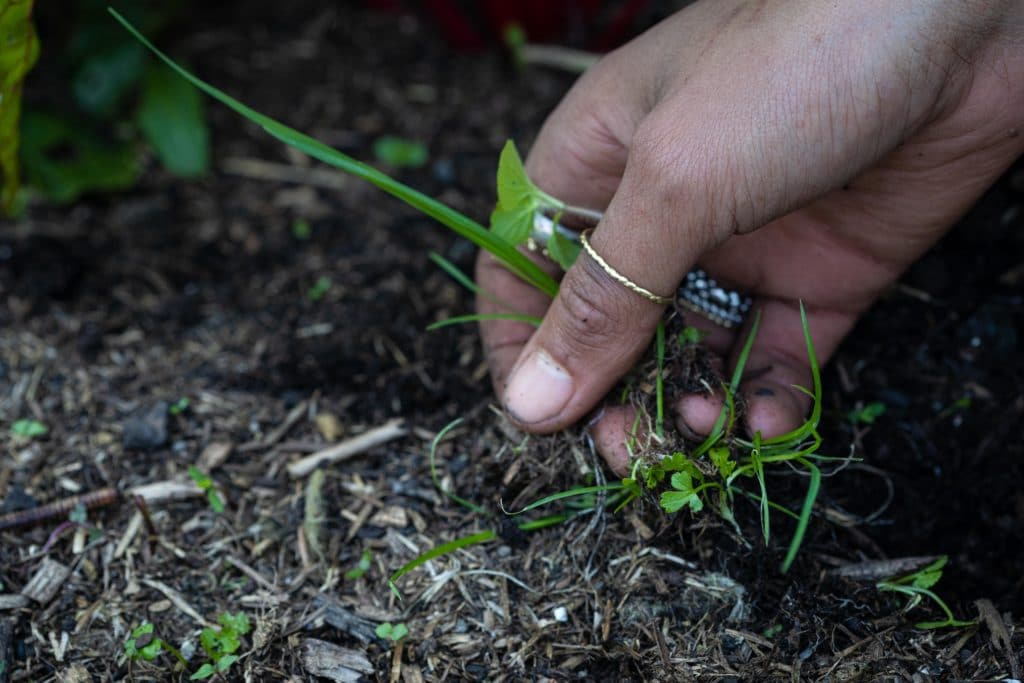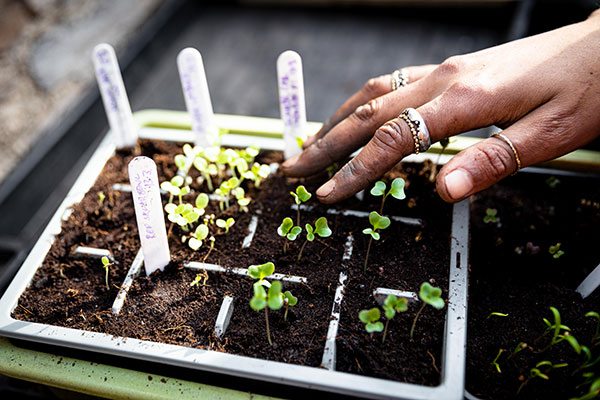Listen to Poppy Okotcha talking and you will be hard-pressed to look at your garden in the same way ever again.
The former model turned ecological grower and forager has gained thousands of followers for her friendly, informed stories on social media of her own gardening journey.
But it’s her belief in gardens as a place for radical change and personal wellbeing that is most compelling, and takes her from the realms of gardening advice to a powerful and rising voice for cultural and environmental activism.
As she describes it, at 30 by five metres her garden in Totnes, south Devon, is average size for the UK, and as such “can offer a blueprint for what’s possible for an average person”. Her aim is to create something functional, but also beautiful, with a focus on edible and medicinal plants.

Having moved from London mid pandemic, she has spent the last 18 months “observing” her space, and the plants and wildlife that live there, including a friendly blackbird who persuaded her to leave in place a tall holly tree.
But she also sees gardens as a “Trojan horse”; a “peaceful place” from which to learn, discuss and address anything from structural inequality to climate change and a consumerist society.
“For me, growing offers such an incredible space, not only for personal wellbeing and growth, but also space where we can connect, grow community and grow food, and grow new cultural narratives for how we should live in the world,” she says.
“I think that’s the power in gardens. They’re not just a space that can be productive, or beautiful, they can be all these things. And I think they can become a really beautiful political tool, in that they’re peaceful and almost like a Trojan horse; no one suspects a garden as being something radical, and then it is.”
This doesn’t sound like something you would pick up from weekend trips to your local garden centre, and sure enough, Okotcha’s connection to gardens was shaped by experiences in her formative years.
Her first memories of green space are aged five, living in the urban sprawl of London, and include a bright purple buddleia bush covered in butterflies, and collecting snails in a bucket. Notable, she says, for already centring on living things rather than food growing, along with a sense of safety in the outside world that was fostered by her mother.
For me, growing offers such an incredible space, not only for personal wellbeing and growth, but also space where we can connect, grow community and grow food, and grow new cultural narratives for how we should live in the world. Poppy Okotcha
Soon after, the family moved to South Africa, a move Okotcha now sees as “crazy” for a mixed race couple only eight years post-Apartheid. But it was here where another part of her identity was formed.
“We were there until I was 12 and that again has really informed a lot of who I am today, seeing racial injustice and disproportionate distribution of wealth and all the effects that come with that,” she says.

Returning to the UK after the breakdown of her parents’ marriage, 12-year-old Okotcha then witnessed the restorative power of gardens first-hand; something that made a lasting impression.
Experiencing financial struggles, the family moved around a lot until, at one of the houses they landed in, her mother managed to cultivate a garden. “For me, seeing her going from a woman who was really broken to growing poppy flowers, or digging a compost heap and a pond, that experience of seeing how it brought life back into her was the thing that taught me how powerful growing can be,” she explains.
Then comes a rather unusual addition to a CV for any gardener, as Okotcha moved to London where she became a model, entering a whirlwind life of runway shows, international photo shoots and Vogue features.
She is, she says, somewhat embarrassed to have this time at the heart of the fast fashion machine “hiding at the back of the cupboard”, but it also brought home the impact of consumerism on both planet and people.
“It only took a few years and I was like, this is madness. This is not just breaking the planet but us as individuals,” she says. “And I think seeing that from the inside of a system that is so fast, very quickly turned me in the opposite direction.”
That direction became rooted in the gardening traditions of permaculture and biodynamics, although Okotcha says she takes “bits and bobs” from each rather than adhering to the letter.
One of the principles she does follow is a passion for soil health, and she can go into the raptures at the drop of a hat over the power of her worm bin and the joys of good compost.
She has also come to see compost as a symbol of how the act of nourishing soil can teach a much wider lesson. “In the garden, it’s the basis for a healthy, thriving ecosystem where things are being cycled,” she says. “And then for me personally, I feel that composting is the dingy, mucky bit that people don’t really talk about. It’s not on the front of the cover of a magazine, it’s not like flowers or the harvest of tomatoes.
“For me, composting has come to symbolise the care you have to put into yourself. The idea that for something new to be born, sometimes something has to die or decay, and create the conditions for next year’s cabbages. That’s something I really try and integrate into my day-to-day life and how I run my activism.”

It’s very typical of a conversation with Okotcha that a story about gardening quickly wends its way into a lesson for life, and this is indeed how she has come to understand her interactions with the natural world. “One of the really powerful things about growing, and when you start to understand systems thinking, very quickly the practices start to become principles that you live by,” she says.
“I think culturally we’re very much living in this eternal summer, like we can just have, have, have, and take, take, take. When we have to replenish the system and it doesn’t work like that. There has to be winter, and you can’t keep taking,” she says.
Seasonality has very much become a buzzword in food, even if there is very limited understanding of what it actually means. “Interestingly with food, seasonality isn’t necessarily the crux of it all, it’s more about whether the food was grown agroecologically,” says Okotcha, who says she “doesn’t buy into” the mantra of feeding herself and her family, and instead feels part of a bigger, sustainable food system through local agroecological and organic veg box schemes.
But back to compost. In a way that feels particularly pertinent given the recent trauma of Covid separating loved ones, Okotcha believes that understanding and witnessing the cycles of life and death in her garden in some way prepared her for the recent loss of her mother-in-law.
“Witnessing seasons, witnessing pests and disease, and just the reality of life and death. It’s a small, small comfort in context of losing a loved one, but somehow it prepares you I think – I’ve found that anyway,” she says.
So often I almost feel resentful for the fact that by being a black woman in this space, it becomes radical. Poppy Okotcha
While her eloquent voicing of the links between planet, people and sustainable living certainly stand out, Okotcha is keen to highlight the value in knowledge passed down through generations and across diverse backgrounds, paying tribute to the many immigrant communities who bring their skills to urban community gardens, as well as the indigenous wisdom around harmony with the natural world that underpins permaculture systems.
But as a visible black woman in the world of food growing, environmentalism and social media, and before that in modelling, she also feels the responsibility of inspiring and giving voice to those who are under-represented.
“It’s a funny one because so often I almost feel resentful for the fact that by being a black woman in this space, it becomes radical,” she says. “And sometimes I just want to be – I don’t want to be part of that. But you are part of that, and that’s the reality of the world we live in today.
“I do know that the first time I saw a black woman in a Vogue magazine I cut it out and put it on my wall, and I ended up in the fashion industry. So I feel like if a little girl growing up sees me, and thinks that looks interesting, I’ll have done something useful. I do think that seeing people who look like us in the industry makes a big difference.”
Gardening, of course, is a hotbed for structural and racial inequality in the UK, as Okotcha is well aware.
“In the UK, 87 per cent of people do have gardens. But as you look into cities it goes down to 60 per cent or so, and then when you look at demographic that’s where the problem of access really starts to emerge,” says Okotcha.
“The gardens are there but they’re there for a certain type of person, and when you start to look at ethnic minority groups, black people are the least likely to have access to green space or indeed gardens. I think [they are] four times less likely than white citizens. England is an incredibly green country, but it’s not necessarily proportionate.”
And you don’t have to go far to understand why this inequality is so unjust.
As an ambassador for the newly formed Nature as a Human Right campaign, Okotcha says: “More and more we’re understanding that, scientifically, that urge for green space has a genuine impact on us psychologically and physiologically. It impacts our lifespan, our success or failure at work, how well we do in school, how we interact with each other, our personal relationships. So much is about green space,” she says.

Collectively, UK gardens make up 10 million acres, more than the total amount covered by protected nature reserves. Seen like that, a movement of ecological growing that keeps carbon in the soil, reduces chemicals, restores wildlife, connects with diverse communities and shares knowledge, is a hugely powerful latent force.
As Okotcha puts it: “I think it can offer an amazing blueprint for cultural change. And when we start to look at issues like climate change, and all the other ethical problems we face today, so much of it is to do with culture. What we think is or isn’t acceptable.”
It might be a blueprint for the future, whether that’s cultural or environmental, but the power of Okotcha’s articulate and inspirational storytelling around gardens is very much in the present, and already inspiring a whole new audience to create positive change.
This interview was originally published in the Wicked Leeks spring-summer print edition. You can read the full magazine for free on Issuu.
Poppy Okotcha is on Instagram @poppyokotcha.
Photography by Stuart Everitt, unless otherwise stated.









I generally love following news about different famous personalities. In particular I like influencer Rose Hart very much and I try to find out as much interesting information about her as possible. I was very surprised when I learned here that there is a very detailed biography about her and very interestingly compiled, with all the details and details. If you are also interested, I recommend you to read it.